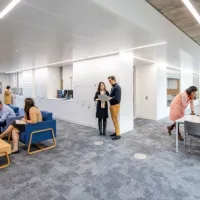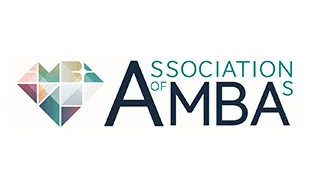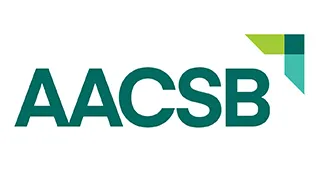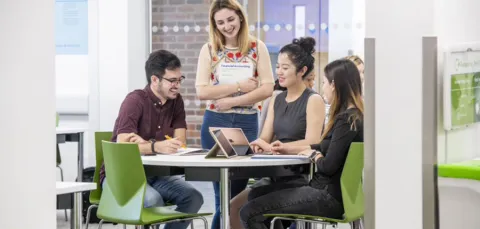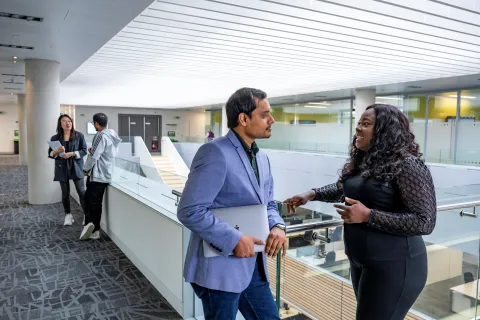About this course
Support your career enhancement, change and acceleration with our transformative, accredited Global Executive MBA programme.
With strong professional and practical approaches to the curriculum, this generalist part-time course builds on your existing relevant work experience and emphasises developing your business skills and managerial practice.
During your studies, you'll build an understanding of current theory and conceptual frameworks across a wide range of management subjects, and apply your knowledge to real-world business problems.
On our Global Executive MBA programme, you'll also learn about:
- management principles, terminology and purposes in contemporary organisations
- opportunities and challenges created by organisational and managerial environments
- enhancing your effectiveness as a manager and business leader
- the interdependent nature of strategies, decisions and managerial practice
Key features of this Global Executive MBA course include:
- a 3-stage course structure, focused on mastering fundamentals, complexity and overall business management
- our Executive Leadership Development Programme (ELDP), with workshop-based leadership skills and behaviours sessions
- up to 2 residential weeks at our state-of-the-art Boldrewood Innovation Campus
- up to 2 international international study trips across the world and live consultancy opportunities
- the opportunity to focus on a topic of your choosing during a summer business project
You can read more about these course features in the 'Course structure' and 'Learning and assessment' sections of this page.
Throughout this 2-year MBA course, we aim to provide a stimulating, challenging, informed and friendly learning environment, and encourage learning from peers and lecturers alike.
You'll have opportunities to develop your self-awareness, reflect on your learning experience, and steer your career towards your desired goals. You'll also be able to develop key transferable skills, from teamwork and leadership to problem solving and decision making.
We regularly review our courses to ensure and improve quality. This course may be revised as a result of this. Any revision will be balanced against the requirement that the student should receive the educational service expected. Find out why, when, and how we might make changes.
Our courses are regulated in England by the Office for Students (OfS).
Course lead
Your course leader is Behzad Hezarkhani, Professor of Operations Management and MBA Director. His research focuses on international supply chain management and logistics, and his work is published in leading business journals worldwide.
Learn more about this subject area
Course location
This course is based at Boldrewood.
Awarding body
This qualification is awarded by the University of Southampton.
Download the Course Description Document
The Course Description Document details your course overview, your course structure and how your course is taught and assessed.
Entry requirements
You'll need at least:
- a 2:2 degree or equivalent international qualification
- a minimum of 5 years' relevant work experience
English language requirements
If English is not your first language, you must show that you can use English to the level we require. Visit our English language pages to find out which qualifications we accept and how you can meet our requirements.
If you are taking the International English Language Testing System (IELTS), you must get at least the following scores:
IELTS score requirements
- overall score
- 6.5
- reading
- 6.0
- writing
- 6.0
- speaking
- 6.0
- listening
- 6.0
If you do not meet the English language requirements through a test or qualification, you may be able to meet them by completing one of our pre-sessional English programmes before you start your course.
Pre-masters
If you don’t meet direct entry requirements, you can apply to complete a Pre-Master's programme through our partnership with OnCampus.
You'll progress to your chosen course after successfully completing the programme. Find out more about Pre-Master's programmes for international students.
Recognition of professional experience
If you don't have the exact entry requirements, but you have significant work experience in this sector we’ll assess your relevant professional experience, your subject knowledge and your aptitude for learning.
Your application will be considered on individual merit and you may be asked to attend an interview.
Got a question?
Please contact us if you're not sure you have the right experience or qualifications to get onto this course.
Email: enquiries@southampton.ac.uk
Tel: +44(0)23 8059 5000
Course structure
There are three stages to our Global Executive MBA programme, which emphasise the developmental journey.
As a part-time student, you are expected to complete the taught element of the programme over the course of 20 months, starting in September. You will work on your business project during the summer, before submitting it in September.
Stage 1: mastering fundamentals
The first stage of the programme focuses on subjects that are fundamental to the running of any business, primarily:
- people and organisations
- corporate accounting and finance
- digital and data-driven marketing
- corporate governance
- global business environment
These basic building blocks of business management are also utilised in year 2 modules.
Stage 2: mastering complexity
The second stage of the programme tackles the complex and integrative nature of business management and leadership – preparing you for the challenges of growth and change in organisations.
This stage also includes further complexity through the development of specialist knowledge, which examines the issues of growth and development in specific business functions and sectors. Within this stage, you will take two optional modules – you can view the full list of available modules in the 'Course structure' section of this page.
Stage 3: mastering business
The third and final, stage of the programme allows you to demonstrate your individual mastery of business management and leadership, in a final business project for an organisation or sector of your choosing.
This is an individual and independent project in which you can bring together all your learning on the programme to help solve a chosen business problem or challenge.
There will be a series of workshops to prepare you for the business project, which cover research methods and associated skills such as client management and business planning.
You can read more about the business project in the 'Modules' section of this page.
Executive Leadership Development Programme
Our Global Executive MBA programme includes a credit-based Executive Leadership Development Programme (ELDP), which provides a series of complementary, workshop-based sessions on leadership skills and behaviours.
The ELDP also hosts guest speakers on contemporary themes in business and management, and offers MBA-focused careers and employability sessions.
This programme is critical to the learning and development throughout the Global Executive MBA, with workshops linked to the theory and knowledge covered within some of the course's core modules.
Throughout the programme, you will be challenged to reflect on the development of your leadership skills. You will also be asked to complete an assessed reflective report at the end of year 2, semester 2. The business project also includes an individual reflective log.
We will help you prepare the learning logs that support your ELDP reflective assignment through 1-to-1 sessions.
Residential study weeks
This MBA course includes a residential week in an international setting, as part of two modules. The international residential part of the Global Business Environment module will include a series of sessions on local business culture, and visits to local businesses to understand business functions in a global setting.
The second residential trip, as part of the Leading Sustainability, Innovation & Change module, involves a group consultancy project, undertaken by a team of 5 to 7 students for a local organisation. The consultancy project will apply learnings from the module to a business problem in a local organisation. This is a group consultancy project undertaken
Due to the highly integrative nature of the consulting project, groups are also encouraged to apply learning from other parts of the MBA to the business problem they are faced with in the local organisation.
Want more detail? See all the modules in the course.
Modules
The modules outlined provide examples of what you can expect to learn on this degree course based on recent academic teaching. As a research-led University, we undertake a continuous review of our course to ensure quality enhancement and to manage our resources. The precise modules available to you in future years may vary depending on staff availability and research interests, new topics of study, timetabling and student demand. Find out why, when and how we might make changes.
For entry in academic year 2026 to 2027
Year 1 modules
You must study the following modules in year 1:
Corporate Financial Management
The overall aim of this module is to provide an overarching understanding of the financial management of corporate organisations. Specifically, the module will firstly give students an overview of the importance of accounting processes as key parts of wid...
Corporate Governance
This module examines corporate governance as the system by which companies are directed and controlled. A particular focus is on the role and contribution of boards and individual directors in governing organisations around the world. The module will shi...
Digital and Data-Driven Marketing
The focus of this module is on the nature of marketing in the context of today's rapidly changing business environment, which primarily means digital and data-driven marketing. The module will provide you with a broad overview of marketing theory and prac...
Global Business Environment
This module is unusual in the MBA programme as it invites students to focus their research and analysis on the global environment rather than internally on their firm. With this external focus in mind the module examines the impact of globalisation and t...
People and Organisations
The module is designed to introduce the main elements of individual and organisational behaviour and human resource (HR) practices in organisations, and therefore focuses on people management. In particular, the module provides a context for you to apprec...
Year 2 modules
You must study the following modules in year 2:
Business Analytics and Risk
In today's era of "big data", business analytics has become a key part of management decision making. Modern managers must now routinely understand the use and value of both qualitative and quantitative data in order to manage risk more effectively. This...
Business Project
The Business Project module forms the third part of the MBA (Mastering Business) and allows students to demonstrate their mastery of business management and leadership in a 'capstone' project for an organisation or business sector. It is an individual an...
Leading Sustainability, Innovation and Change
This module acts as a key vehicle for the completion of the taught part of the MBA programme and comprises of teaching based in Southampton and an international study trip which includes a 'live' group consulting project for a local organisation. It compr...
Strategy and Decision Making
The module aims to provide an overview of the relevant theories, tools and techniques in corporate, competitive and international business strategy focusing on strategic analyses, strategy formulation, strategic decision-making and choices and strategy im...
You must also choose from the following modules in year 2:
Blockchain Technology and Cryptocurrency Investment
This course will explore the architecture of Blockchain technology that is rapidly changing the landscape of the financial industry and beyond. Countless applications are being explored in payments, insurance, lending, fund raising, settlement of securiti...
Business Planning
This module has a very practical focus on the development of effective business plans. The taught content will address what is required in a business plan, including variations that occur across sectors or industries. At the end of the course, learners wi...
Deeper Analytics and Big Data
In today’s era of “big data”, business analytics has become a key part of management decision making. Modern managers must now develop a deeper understanding of the use and value of big data and of the various analytical tools which are available to make...
Entrepreneurship and New Venture Design
This module will look at processes supporting the design of new entrepreneurial ventures and offerings. In teams, students will follow a number of experimental and participative models to develop and test prototype ideas. The academic discipline of entrep...
Executive Leadership Development Programme (LDP)
This module sits at the core of your development on the Global Executive MBA (GEMBA), and in its focus on developing Future Leaders. In an increasingly volatile, uncertain, changing and ambiguous (VUCA) global environment, the requirements for leaders to ...
International Banking
This module is focused on banking, as opposed to financial market or accounting and finance-related courses otherwise on offer in the MBA. Students will learn about the 'micro' side of banking, including financial institutions, instruments and techniques,...
Maritime Operations and Risk
The UK is a world leader in many areas of maritime business services, education and research and provides many of the essential services that keep world shipping in operation. While no longer a major centre for large scale commercial shipbuilding, the UK ...
Operations Management
This module will examine the strategic importance of operations management in manufacturing and service settings in both private and public sectors. In the past, where organisations tended to be more hierarchical than today, the words, "strategy" and "ope...
Project Management
In this module you will explore the fundamentals of project management and its application in different contexts. It will examine the characteristics of projects, such as sources of complexity and uncertainty, that can impact the successful delivery of pr...
Responsible Leadership
This module covers the principles and practices of responsible leadership. It looks at the philosophical foundations of ethics and applies principles to real-life cases and hypothetical dilemmas. Techniques of ethical management are presented. Causes and ...
Strategic Brand Management
Supply Management
This module offers a comprehensive examination of strategic purchasing and supply management, emphasizing their pivotal roles within modern organisations. It explores the principles that underpin supply markets, inter-organisational relationships, and the...
Learning and assessment
Learning
Teaching and contact hours
This Global Executive MBA programme has over 500 contact hours to allow for a balance of theoretical and applied learning in the classroom. This conforms to the standard set by the Associations of MBAs, which accredits MBA programmes globally.
You'll gain an understanding and knowledge of the techniques and approaches to business and management through a mixture of:
- lectures
- group discussions and practical exercises
- case studies
- simulations
- ‘live’ business projects
- reading
- assessed coursework
We've designed the curriculum to include use of international case studies, a sharing of cultural understanding in teamwork, and consideration of contemporary business trends and issues in decision making and problem solving.
Our Global Executive MBA lecturers understand the need to encourage critical and evaluative reflection and contribution from the class in any teaching context. Many teaching sessions also include small group discussions or exercises, providing opportunity for peer group interaction.
You are free to contribute at any time in class. Many of your contributions will be based on your work experience or practices employed in your own organisations. These comments frequently reveal a huge variety in managerial practice, and lead into discussions about why this is so.
Group working
Teamwork and group assessment is an important feature of our Global Executive MBA, as well as individual coursework and exams. This provides more in-depth opportunities for you to learn from one another’s experience, and a strong incentive to develop skills in managing and leading a group.
Teamwork is critical to the development of management and leadership skills, which are highly transferable to employment following the course. You will be asked to work in groups at numerous occasions throughout the programme to further develop your ability to strengthen your skill sets.
Assessment
Formal assessment
We formally assess modules through combinations of examination and coursework – both individual and group based – with some modules using exclusively one or two of these forms. These are intentionally varied to test different aspects of the learning, and cater for different learning styles.
We design our assessments to test your understanding of the material covered, and your ability to apply concepts and theories to business and management problems.
Formal assessments, also known as summative assessments, on the programme include:
- written unseen examinations or time-based assignments
- essays
- reflective reports
- group-based work
We aim to have a relatively even split between individual assignments, exams and time-restricted assignments, while also reflecting the importance of group-based assignments in an MBA programme.
Informal assessment and feedback
Informal assessments, also known as formative assessments, normally occur in preparation for summative assessments.
The tutor will give you either oral or written formative feedback in all modules of the programme.
Example of formative assessments and feedback include:
- mock presentations in class
- mock exams
- tutor feedback on a draft plan for an individual or a group assignment
Business project
The business project on our Global Executive MBA programme acts as a mechanism for you to combine your previous learning and ability to conduct an independent piece of work.
Completing a business project gives you a unique opportunity to undertake an extended piece of personal research on a topic of your choice.
We will allocate you a supervisor for the project – if possible, we will aim to match your research interests with those of the staff within the Business School.
Business projects can take a number of forms, such as:
- empirical work involving quantitative analysis of collected data
- a case study of a particular firm or industry
- study of a particular problem in an organisation or industry
- a survey of business practice in a particular context
- a business plan which can be used for a new business venture
Your business project should not exceed 12,00 words in total, and will comprise:
- the main 9,000-word report
- a 1,000-word project reflection, allowing you to comment on the project
- a 2,000-word research proposal
Only the main report and project reflection will be assessed as part of the project. The research proposal is not assessment, but you will be given formative feedback from it.
Academic Support
We'll support you with personalised sessions on study skills such as:
- academic writing and referencing
- group work
- presentations
You'll meet with your personal academic tutor throughout the year for help and advice. You can also speak to members of the Global Executive MBA staff team for guidance.
Careers and employability
The employability and enterprise skills you'll gain from this course are reflected in the Southampton skills model. When you join us you'll be able to use our skills model to track, plan, and benefit your career development and progress.
Download skills overview

Work experience opportunities
Choosing to do work experience is a great way to enhance your employability, build valuable networks, and evidence your potential. Learn about the different work and industry experience options at Southampton.
Careers services and support
We are a top 20 UK university for employability (QS Graduate Employability Rankings 2022). Our Careers, Employability and Student Enterprise team will support you. This support includes:
- work experience schemes
- CV and interview skills and workshops
- networking events
- careers fairs attended by top employers
- a wealth of volunteering opportunities
- study abroad and summer school opportunities
We have a vibrant entrepreneurship culture and our dedicated start-up supporter, Futureworlds, is open to every student.
Your career ideas and graduate job opportunities may change while you're at university. So it is important to take time to regularly reflect on your goals, speak to people in industry and seek advice and up-to-date information from Careers, Employability and Student Enterprise professionals at the University.
Fees, costs and funding
Tuition fees
This is a two-year course.
Fees are split into two payments:
- UK students pay £17,800 in the first year and £17,800 in the second year
- EU and international students pay £17,800 in the first year and £17,800 in the second year
Deposit
If you're an international student on a full-time course, we'll ask you to pay £2,000 of your tuition fees in advance, as a deposit.
Your offer letter will tell you when this should be paid and provide full terms and conditions.
Find out about exemptions, refunds and how to pay your deposit on our tuition fees for overseas students page.
What your fees pay for
Your tuition fee covers the full cost of tuition and any exams. The fee you pay will remain the same each year from when you start studying this course. This includes if you suspend and return.
Find out how to pay your tuition fees.
Accommodation and living costs, such as travel and food, are not included in your tuition fees. There may also be extra costs for retake and professional exams.
Explore:
Extra costs you might have to pay
You'll have to pay for international travel costs to and from any residential study week destinations.
The University will pay for your hotel accommodation during the residential study weeks, and University insurance covers students during course-related travel. However, you may wish to take out additional cover at your own cost.
10% alumni discount
If you’re a graduate of the University of Southampton, you could be eligible for a 10% discount on your postgraduate tuition fees.
Postgraduate Master’s Loans (UK nationals only)
This can help with course fees and living costs while you study a postgraduate master's course.
If you study part-time, you may not be eligible for this loan. Find out if you're eligible.
Southampton Business School (MBA) Excellence International Scholarship
Up to £13,000 is available to UK and international students studying for the Master of Business Administration (MBA). They are awarded to candidates who can best demonstrate business excellence in an interview.
Scholarships are available for 3 different amounts:
- £13,000
- £10,000
- £7,000
The amount you get is determined by your performance at interview.
Find out more about the Southampton Business School (MBA) Excellence International Scholarship, including eligibility, deadlines and how to apply.
Southampton Business School (MBA) Future Leader Scholarship
Five scholarships of £15,000 are available to UK and international students studying Master of Business Administration (MBA).
Find out more about the Southampton Business School (MBA) Future Leader Scholarship, including eligibility, deadlines and how to apply.
Global Excellence Scholarship
83 Global Excellence Scholarships of £3,000 off tuition fees are available to new international postgraduate students applying for an in person postgraduate master’s programme.
Other postgraduate funding options
A variety of additional funding options may be available to help you pay for your master’s study. Both from the University and other organisations.
Funding for EU and international students
Find out about funding you could get as an international student.
How to apply
- Use the blue 'apply for this course' button on this page to take you to our postgraduate admissions system.
- Create an account which gives you access to your own application portal. .
- Search for the course you want to apply for.
- Complete the application form and upload any supporting documents.
- Submit your application.
For further details of our admission process, read our step by step guide to postgraduate taught applications.
Application deadlines
UK students
The deadline to apply for this course is Wednesday 2 September 2026, midday UK time.
We advise applying early as applications may close before the expected deadline if places are filled.
International students
The deadline to apply for this course is Wednesday 19 August 2026, midday UK time.
We advise applying early as applications may close before the expected deadline if places are filled.
Application assessment fee
There is no application assessment fee for postgraduate courses starting in 2026.
Supporting information
When you apply you’ll need to submit a personal statement explaining why you want to take the course.
You’ll need to include information about:
- your knowledge of the subject area
- why you want to study a postgraduate qualification in this course
- how you intend to use your qualification
You'll also need to submit two academic references.
Please include the required paperwork showing your first degree and your IELTS English language test score (if you are a non-native English speaker) with your application. Without these, your application may be delayed.
What happens after you apply
You'll be able to track your application through our online Applicant Record System.
We will aim to send you a decision 6 weeks after you have submitted your application.
If we offer you a place, you will need to accept the offer within 30 working days. If you do not meet this deadline, we will offer your place to another applicant.
Unfortunately, due to number of applications we receive, we may not be able to give you specific feedback on your application if you are unsuccessful.
We may invite you to an interview, which will take place by phone if you live abroad. You'll get an email from the admissions tutor if we'd like to talk to you before offering you a place.
Equality and diversity
We treat and select everyone in line with our Equality and Diversity Statement.
Got a question?
Please contact us if you're not sure you have the right experience or qualifications to get onto this course.
Email: enquiries@southampton.ac.uk
Tel: +44(0)23 8059 5000
Related courses
-
Study
- View all courses
- Taught postgraduate study
- Pre-sessional English courses
-
Subjects
- Acoustical engineering
- Aeronautical and astronautical engineering
- Ageing and gerontology
- Archaeology
- Art, design and fashion
- Audiology
- Biological sciences
- Biomedical and medical engineering
- Business, accounting, finance and marketing
- Chemistry
- Civil engineering
- Computer science and software engineering
- Economics
- Education
- Electrical and electronic engineering
- English
- Film studies
- French
- Geography and environmental science
- History
- Languages and linguistics
- Law
- Maritime engineering
- Mathematical sciences
- Mechanical engineering
- Medicine
- Music
- Nursing, midwifery and healthcare
- Ocean and Earth science
- Philosophy
- Photonics and optoelectronics
- Physics and astronomy
- Politics and international relations
- Psychology
- Social statistics and demography
- Sociology, social policy and criminology
-
PhDs and research degrees
- Create your own research project
-
Find a PhD project
- A missing link between continental shelves and the deep sea: Have we underestimated the importance of land-detached canyons?
- A study of rolling contact fatigue in electric vehicles (EVs)
- Acoustic monitoring of forest exploitation to establish community perspectives of sustainable hunting
- Acoustic sensing and characterisation of soil organic matter
- Advancing intersectional geographies of diaspora-led development in times of multiple crises
- Aero engine fan wake turbulence – Simulation and wind tunnel experiments
- Against Climate Change (DACC): improving the estimates of forest fire smoke emissions
- All-in-one Mars in-situ resource utilisation (ISRU) system and life-supporting using non-thermal plasma
- An electromagnetic study of the continent-ocean transition southwest of the UK
- An investigation of the relationship between health, home and law in the context of poor and precarious housing, and complex and advanced illness
- Antibiotic resistance genes in chalk streams
- Being autistic in care: Understanding differences in care experiences including breakdowns in placements for autistic and non-autistic children
- Biogeochemical cycling in the critical coastal zone: Developing novel methods to make reliable measurements of geochemical fluxes in permeable sediments
- Bloom and bust: seasonal cycles of phytoplankton and carbon flux
- British Black Lives Matter: The emergence of a modern civil rights movement
- Building physics for low carbon comfort using artificial intelligence
- Business studies and management: accounting
- Business studies and management: banking and finance
- Business studies and management: decision analytics and risk
- Business studies and management: digital and data driven marketing
- Business studies and management: human resources (HR) management and organisational behaviour
- Business studies and management: strategy, innovation and entrepreneurship
- Carbon storage in reactive rock systems: determining the coupling of geo-chemo-mechanical processes in reactive transport
- Cascading hazards from the largest volcanic eruption in over a century: What happened when Hunga Tonga-Hunga Ha’apai erupted in January 2022?
- Characterisation of cast austenitic stainless steels using ultrasonic backscatter and artificial intelligence
- Climate Change effects on the developmental physiology of the small-spotted catshark
- Climate at the time of the Human settlement of the Eastern Pacific
- Collaborative privacy in data marketplaces
- Compatibility of climate and biodiversity targets under future land use change
- Cost of living in modern and fossil animals
- Creative clusters in rural, coastal and post-industrial towns
- Deep oceanic convection: the outsized role of small-scale processes
- Defect categories and their realisation in supersymmetric gauge theory
- Defining the Marine Fisheries-Energy-Environment Nexus: Learning from shocks to enhance natural resource resilience
- Design and fabrication of next generation optical fibres
- Developing a practical application of unmanned aerial vehicle technologies for conservation research and monitoring of endangered wildlife
- Development and evolution of animal biomineral skeletons
- Development of all-in-one in-situ resource utilisation system for crewed Mars exploration missions
- Ecological role of offshore artificial structures
- Effect of embankment and subgrade weathering on railway track performance
- Efficient ‘whole-life’ anchoring systems for offshore floating renewables
- Electrochemical sensing of the sea surface microlayer
- Engagement with nature among children from minority ethnic backgrounds
- Enhancing UAV manoeuvres and control using distributed sensor arrays
- Ensuring the Safety and Security of Autonomous Cyber-Physical Systems
- Environmental and genetic determinants of Brassica crop damage by the agricultural pest Diamondback moth
- Estimating marine mammal abundance and distribution from passive acoustic and biotelemetry data
- Evolution of symbiosis in a warmer world
- Examining evolutionary loss of calcification in coccolithophores
- Explainable AI (XAI) for health
- Explaining process, pattern and dynamics of marine predator hotspots in the Southern Ocean
- Exploring dynamics of natural capital in coastal barrier systems
- Exploring the mechanisms of microplastics incorporation and their influence on the functioning of coral holobionts
- Exploring the potential electrical activity of gut for healthcare and wellbeing
- Exploring the trans-local nature of cultural scene
- Facilitating forest restoration sustainability of tropical swidden agriculture
- Faulting, fluids and geohazards within subduction zone forearcs
- Faulting, magmatism and fluid flow during volcanic rifting in East Africa
- Fingerprinting environmental releases from nuclear facilities
- Flexible hybrid thermoelectric materials for wearable energy harvesting
- Floating hydrokinetic power converter
- Glacial sedimentology associated subglacial hydrology
- Green and sustainable Internet of Things
- How do antimicrobial peptides alter T cell cytokine production?
- How do calcifying marine organisms grow? Determining the role of non-classical precipitation processes in biogenic marine calcite formation
- How do neutrophils alter T cell metabolism?
- How well can we predict future changes in biodiversity using machine learning?
- Hydrant dynamics for acoustic leak detection in water pipes
- If ‘Black Lives Matter’, do ‘Asian Lives Matter’ too? Impact trajectories of organisation activism on wellbeing of ethnic minority communities
- Illuminating luciferin bioluminescence in dinoflagellates
- Imaging quantum materials with an XFEL
- Impact of neuromodulating drugs on gut microbiome homeostasis
- Impact of pharmaceuticals in the marine environment in a changing world
- Improving subsea navigation using environment observations for long term autonomy
- Information theoretic methods for sensor management
- Installation effect on the noise of small high speed fans
- Integrated earth observation mapping change land sea
- Interconnections of past greenhouse climates
- Investigating IgG cell depletion mechanisms
- Is ocean mixing upside down? How mixing processes drive upwelling in a deep-ocean basin
- Landing gear aerodynamics and aeroacoustics
- Lightweight gas storage: real-world strategies for the hydrogen economy
- Machine learning for multi-robot perception
- Machine learning for multi-robot perception
- Marine ecosystem responses to past climate change and its oceanographic impacts
- Mechanical effects in the surf zone - in situ electrochemical sensing
- Microfluidic cell isolation systems for sepsis
- Migrant entrepreneurship, gender and generation: context and family dynamics in small town Britain
- Miniaturisation in fishes: evolutionary and ecological perspectives
- Modelling high-power fibre laser and amplifier stability
- Modelling soil dewatering and recharge for cost-effective and climate resilient infrastructure
- Modelling the evolution of adaptive responses to climate change across spatial landscapes
- Nanomaterials sensors for biomedicine and/or the environment
- New high-resolution observations of ocean surface current and winds from innovative airborne and satellite measurements
- New perspectives on ocean photosynthesis
- Novel methods of detecting carbon cycling pathways in lakes and their impact on ecosystem change
- Novel technologies for cyber-physical security
- Novel transparent conducting films with unusual optoelectronic properties
- Novel wavelength fibre lasers for industrial applications
- Ocean circulation and the Southern Ocean carbon sink
- Ocean influence on recent climate extremes
- Ocean methane sensing using novel surface plasmon resonance technology
- Ocean physics and ecology: can robots disentangle the mix?
- Ocean-based Carbon Dioxide Removal: Assessing the utility of coastal enhanced weathering
- Offshore renewable energy (ORE) foundations on rock seabeds: advancing design through analogue testing and modelling
- Optical fibre sensing for acoustic leak detection in buried pipelines
- Optimal energy transfer in nonlinear systems
- Optimal energy transfer in nonlinear systems
- Optimizing machine learning for embedded systems
- Oxidation of fossil organic matter as a source of atmospheric CO2
- Partnership dissolution and re-formation in later life among individuals from minority ethnic communities in the UK
- Personalized multimodal human-robot interactions
- Preventing disease by enhancing the cleaning power of domestic water taps using sound
- Quantifying riparian vegetation dynamics and flow interactions for Nature Based Solutions using novel environmental sensing techniques
- Quantifying the response and sensitivity of tropical forest carbon sinks to various drivers
- Quantifying variability in phytoplankton electron requirements for carbon fixation
- Resilient and sustainable steel-framed building structures
- Resolving Antarctic meltwater events in Southern Ocean marine sediments and exploring their significance using climate models
- Robust acoustic leak detection in water pipes using contact sound guides
- Silicon synapses for artificial intelligence hardware
- Smart photon delivery via reconfigurable optical fibres
- The Gulf Stream control of the North Atlantic carbon sink
- The Mayflower Studentship: a prestigious fully funded PhD studentship in bioscience
- The calming effect of group living in social fishes
- The duration of ridge flank hydrothermal exchange and its role in global biogeochemical cycles
- The evolution of symmetry in echinoderms
- The impact of early life stress on neuronal enhancer function
- The oceanic fingerprints on changing monsoons over South and Southeast Asia
- The role of iron in nitrogen fixation and photosynthesis in changing polar oceans
- The role of singlet oxygen signaling in plant responses to heat and drought stress
- Time variability on turbulent mixing of heat around melting ice in the West Antarctic
- Triggers and Feedbacks of Climate Tipping Points
- Uncovering the drivers of non-alcoholic fatty liver disease progression using patient derived organoids
- Understanding recent land-use change in Snowdonia to plan a sustainable future for uplands: integrating palaeoecology and conservation practice
- Understanding the role of cell motility in resource acquisition by marine phytoplankton
- Understanding the structure and engagement of personal networks that support older people with complex care needs in marginalised communities and their ability to adapt to increasingly ‘digitalised’ health and social care
- Unpicking the Anthropocene in the Hawaiian Archipelago
- Unraveling oceanic multi-element cycles using single cell ionomics
- Unravelling southwest Indian Ocean biological productivity and physics: a machine learning approach
- Using acoustics to monitor how small cracks develop into bursts in pipelines
- Using machine learning to improve predictions of ocean carbon storage by marine life
- Vulnerability of low-lying coastal transportation networks to natural hazards
- X-ray imaging and property characterisation of porous materials
- Funding your research degree
- How to apply for a PhD or research degree
- How to make a PhD enquiry
- Support while studying your PhD or research degree
- Exchanges and studying abroad
- Undergraduate study
-
Tuition fees, funding and scholarships
- Fee status
- Scholarships
- Undergraduate funding options
-
Postgraduate funding options
-
Postgraduate scholarships
- Black Futures Postgraduate Research Scholarships (Environmental and Life Sciences)
- Black Futures scholarship
- China Excellence Scholarship
- GREAT Scholarships 2025 – Egypt
- GREAT Scholarships 2025 – France
- GREAT Scholarships 2025 – Ghana
- Horizon Europe fee waiver
- India Excellence Scholarship
- Nigeria Excellence Scholarship
- Nursing Global Impact Scholarship
- Postgraduate Taught Diversity Scholarship (Environmental and Life Sciences)
- Social Impact Scholarships
- Southampton Business School (MSc) Dean Scholarship (UK)
- Southampton Faculty of Medicine PGT Talent Scholarship
- Southampton History Patricia Mather and Helen Patterson Scholarship
- Southampton MA Holocaust scholarships
- Southampton Philosophy David Humphris-Norman Scholarship
- Southampton Philosophy MA Scholarship
- Southampton Photonics Impact Scholarship
- Southampton UK Alumni Music Scholarship
- Study in Art and Media Technology Scholarship
- Thailand Excellence Scholarship
- The National Institute for Health and care Research South Central INSIGHT Programme
- The South Coast Doctoral Training Partnership Social Science PhD Studentships
- Vietnam Excellence Scholarship
- Spärck AI Scholarship
-
Postgraduate scholarships
-
International funding options
-
Scholarships for international students
- Engineering Global Talent Scholarship
- Higher Education Scholarships for Palestinians - HESPAL
- Medical Technology, Innovation and Design Master’s Scholarship
- Merit scholarships for international undergraduates
- Presidential bursaries
- Winchester School of Art Postgraduate Global Talent Scholarship
- Becas Chile Scholarship
- Chevening Scholarships
- China Scholarship Council Scholarships
- COLFUTURO Scholarships
- Commonwealth Distance Learning Scholarships
- Commonwealth Master's Scholarships
- Commonwealth PhD Scholarships
- Commonwealth PhD Scholarships for high income countries
- Commonwealth Shared Scholarships
- Excellence Scholarship
- FIDERH Scholarships
- Southampton Education Civic Scholarship
- Fulbright Awards
- Southampton Ageing and Gerontology Talent Scholarship
- Southampton Teachers' Postgraduate Scholarship
- FUNED Scholarships
- Great Scholarships 2024 – Mexico
- Great Scholarships 2024 – Nigeria
- Marshall Scholarship
- Saïd Foundation Scholarships
- Southampton Canadian Prestige Scholarship for Law
- Xiamen University PhD Scholarships
- GREAT scholarships 2026 – Indonesia
-
Scholarships for international students
- External funding opportunities
- Short courses
- Lunchtime evening and weekend courses
- Clearing
- Summer schools
- Get a prospectus
- Student life
-
Research
- Our impact
- Research projects
- Research areas
- Research facilities
- Collaborate with us
-
Institutes, centres and groups
- Active Living
- Advanced Fibre Applications
- Advanced Laser Laboratory
- Advanced Project Management Research Centre
- Antibody and Vaccine Group
- Astronomy Group
- Autism Community Research Network @ Southampton (ACoRNS)
- Bioarchaeology and Osteoarchaeology at Southampton (BOS)
- Bladder and Bowel Management
- Cell and Developmental Biology
- Centre for Defence and Security Research
- Centre for Developmental Origins of Health and Disease
- Centre for Digital Finance
- Centre for Eastern European and Eurasian Studies (CEEES)
- Centre for Empirical Research in Finance and Banking (CERFIB)
- Centre for Geometry, Topology, and Applications
- Centre for Global Health and Policy (GHaP)
- Centre for Green Maritime Innovation (cGMI)
- Centre for Health Technologies
- Centre for Healthcare Analytics
- Centre for Human Development, Stem Cells and Regeneration
- Centre for Imperial and Postcolonial Studies
- Centre for Inclusive and Sustainable Entrepreneurship and Innovation (CISEI)
- Centre for International Film Research (CIFR)
- Centre for International Law and Globalisation
- Centre for Internet of Things and Pervasive Systems
- Centre for Justice Studies
- Centre for Linguistics, Language Education and Acquisition Research
- Centre for Machine Intelligence
- Centre for Maritime Archaeology
- Centre for Medieval and Renaissance Culture (CMRC)
- Centre for Political Ethnography (CPE)
- Centre for Research in Accounting, Accountability and Governance
- Centre for Research on Work and Organisations
- Centre for Resilient Socio-Technical Systems
- Centre for Transnational Studies
- Child and Adolescent Research Group
- Clinical Ethics, Law and Society (CELS)
- Clinical Legal Education
- Computational Nonlinear Optics
- Cyber Security Academy
- Data Science Group
- Digital Oceans
- EPSRC and MOD Centre for Doctoral Training in Complex Integrated Systems for Defence and Security
- Economic Theory and Experimental Economics
- Economy, Society and Governance
- Electrical Power Engineering
- Environmental Hydraulics
- Gas Photonics in Hollow Core Fibres
- Geochemistry
- Global Health (Demography)
- Global Health Community of Practice
- Gravity group
- High Power Fibre Lasers
- Hollow Core Fibre
- Human Genetics and Genomic Medicine
- Infection
- Infrastructure Group
- Institute of Developmental Sciences
- Institute of Maritime Law (IML)
- Integrated Photonic Devices
- Interdisciplinary Musculoskeletal Health
- International Centre for Ecohydraulics Research (ICER)
- Language Assessment and Testing Unit (LATU)
- Laser-Direct-Write (LDW) Technologies for Biomedical Applications
- Law and Technology Centre
- Long Term Conditions
- Magnetic Resonance
- Mathematical Modelling
- Medicines Management
- Molecular and Precision Biosciences
- Multiwavelength Accretion and Astronomical Transients
- National Biofilms Innovation Centre (NBIC)
- National Centre for Research Methods
- National Infrastructure Laboratory
- Nature-Based Ocean Solutions
- Nonlinear Semiconductor Photonics
- Ocean Perception Group
- Operational Research
- Optical Engineering and Quantum Photonics Group
- Paediatrics and Child Health - Clinical and Experimental Sciences
- People, Property, Community
- Photonic Systems, Circuits and Sensors Group
- Physical Optics
- Primary Care Research Centre
- Quantum, Light and Matter Group
- Silica Fibre Fabrication
- Silicon Photonics
- Skin Sensing Research Group
- Southampton Ethics Centre
- Southampton Health Technology Assessments Centre (SHTAC)
- Southampton High Energy Physics group
- Southampton Imaging
- Southampton Theory Astrophysics and Gravity (STAG) Research Centre
- Stefan Cross Centre for Women, Equality and Law
- String theory and holography
- The India Centre for Inclusive Growth and Sustainable Development
- The Parkes Institute
- Tony Davies High Voltage Laboratory
- Ultrafast X-ray Group
- Vision Science
- WSA Exchange
- Work Futures Research Centre (WFRC)
- Support for researchers
- Faculties, schools and departments
- Interdisciplinary research
- Find people and expertise
- Research jobs
- Business
- Global
- About
- Visit
- Alumni
- Departments
- News
- Events
- Contact
Accounting and Finance
Accounting and Management
Banking and Finance
Business Analytics and Finance
Business Analytics and Management Science
Business and Heritage Management
Business Strategy and Innovation Management
Digital Business
Digital Marketing
Digital Strategy and Information Systems
Finance
Finance and Econometrics
Finance and Economics
Finance and Investment

Human Resource Management
International Accounting and Governance
International Accounting and Sustainability
International Entrepreneurship and Management

International Management
Logistics and Supply Chain Analytics
Management
Management and Artificial Intelligence
Marketing Analytics
Marketing Management
